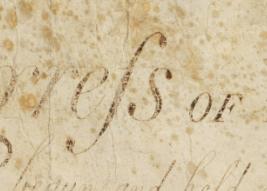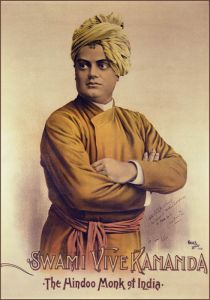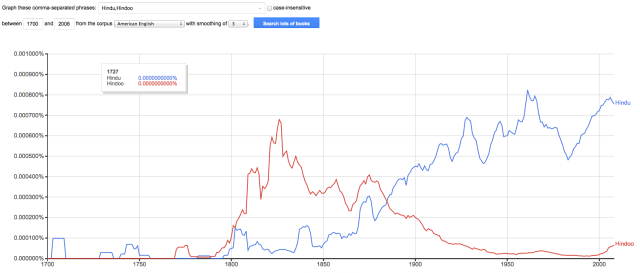Hindoos, Hindus, Spelling, and Theory
Michael J. Altman
What is the relationship between spelling and theory? I often tell people my research is about "Hinduism in nineteenth century America." But it's really not. It's not about Hinduism at all. It can't be because the idea of "Hinduism," a world religion comparable to other world religions, isn't invented until the late nineteenth century. That's kind of the point of my research. Most other scholars writing about this period will still use the term "Hindu" to describe the people that Americans or Britons were describing during this period. But when an American missionary or Unitarian pastor refered to the people in India doing something that they recognize as religion they most often used the term "Hindoo." Hindoo--that double O of colonialism.
So, here's the question: Is the difference between Hindoo and Hindu just a matter of spelling? Or is there more going on here?
 On the one hand, you could argue that though the sources read Hindoo, it makes sense for the scholar today to write Hindu, even when talking about the 1820s. There are all sorts of terms that we alter when we bring them into the present from the past. No one puts the long S in their scholarly prose, for example. So, maybe Hindoo to Hindu is just like taking that long s out of Congress in the Bill of Rights?
On the one hand, you could argue that though the sources read Hindoo, it makes sense for the scholar today to write Hindu, even when talking about the 1820s. There are all sorts of terms that we alter when we bring them into the present from the past. No one puts the long S in their scholarly prose, for example. So, maybe Hindoo to Hindu is just like taking that long s out of Congress in the Bill of Rights?
But maybe it's not. It seems to me a Hindu is actually someone quite different from a Hindoo. That is, a Hindu is someone tied up with this world religion called Hinduism. There is the Hindu American Foundation, the Vishwa Hindu Parishad (or World Hindu Council), and the Pew Research Center tallies up the number of "Hindus" in America. But in the early nineteenth century, a Hindoo was a product of the American and British imagination. When I discuss what Americans thought about India and the people who lived there and these things they did that Americans thought were religion, I am not talking about people in South Asia. I'm talking about representations of people in South Asia. These Hindoos are imaginary. "Hindoos" and their religion were invented by Europeans and Americans. During this period, people in India did not present themselves to an American audience. Rather, they were represented by American and European authors to an American audience and in that process they were represented as Hindoos.
 Perhaps the one exception to this would be the Indian reformer Rammohun Roy who wrote in English to an American and British audience. However, Roy self-identified as a "Hindoo," as in his work "A Defence of Hindoo Theism." Even as late as the 1893 World's Parliament of Religions, Americans represented Swami Vivekananda, the South Asian who garnered an audience throughout America, as a "Hindoo Monk." Vivekananda and Rammohun Roy served as transitional figures as Hindoos became Hindus. That is, as South Asians went from imagined representations to immigrants representing themselves in American culture. In 1893 Vivekananda was a "Hindoo monk" but by 1930 he is part of a "Hindu Movement" in Wendell Thomas's book Hinduism Invades America. Vivekananda goes from Hindoo to Hindu, from a South Asian represented by Americans in Chicago to the founder of a movement representing itself in America.
Perhaps the one exception to this would be the Indian reformer Rammohun Roy who wrote in English to an American and British audience. However, Roy self-identified as a "Hindoo," as in his work "A Defence of Hindoo Theism." Even as late as the 1893 World's Parliament of Religions, Americans represented Swami Vivekananda, the South Asian who garnered an audience throughout America, as a "Hindoo Monk." Vivekananda and Rammohun Roy served as transitional figures as Hindoos became Hindus. That is, as South Asians went from imagined representations to immigrants representing themselves in American culture. In 1893 Vivekananda was a "Hindoo monk" but by 1930 he is part of a "Hindu Movement" in Wendell Thomas's book Hinduism Invades America. Vivekananda goes from Hindoo to Hindu, from a South Asian represented by Americans in Chicago to the founder of a movement representing itself in America.
Here's the shift from Hindoo to Hindu in one handy Ngram. The lines cross in the year 1884:

For most of my brief career I've fallen back on the term "Hindu religions" to describe whatever it was that Americans and the British were trying to describe in their writing. But I've decided to eject that term from my work going forward because it implies that there is something there that is essentially "Hindu" before someone labels it as such. There is no there there, however. There is only the discourse about whatever people in South Asia seem to be doing to Europeans and Americans. So, I'm going back to Hindoo, colonial Os and all, to emphasize that nothing is "Hindu" or "Hindoo" until someone categorizes it as such. And then, once categorized, my job is to unpack the conflicts, arguments, ideologies, claims, and competitions behind that categorization. But I am curious to hear from others on this question--and similar questions about, say, "evangelical" or other such categories. Is this all simply a word game?
What is the relationship between spelling and theory? I often tell people my research is about "Hinduism in nineteenth century America." But it's really not. It's not about Hinduism at all. It can't be because the idea of "Hinduism," a world religion comparable to other world religions, isn't invented until the late nineteenth century. That's kind of the point of my research. Most other scholars writing about this period will still use the term "Hindu" to describe the people that Americans or Britons were describing during this period. But when an American missionary or Unitarian pastor refered to the people in India doing something that they recognize as religion they most often used the term "Hindoo." Hindoo--that double O of colonialism.
So, here's the question: Is the difference between Hindoo and Hindu just a matter of spelling? Or is there more going on here?
 On the one hand, you could argue that though the sources read Hindoo, it makes sense for the scholar today to write Hindu, even when talking about the 1820s. There are all sorts of terms that we alter when we bring them into the present from the past. No one puts the long S in their scholarly prose, for example. So, maybe Hindoo to Hindu is just like taking that long s out of Congress in the Bill of Rights?
On the one hand, you could argue that though the sources read Hindoo, it makes sense for the scholar today to write Hindu, even when talking about the 1820s. There are all sorts of terms that we alter when we bring them into the present from the past. No one puts the long S in their scholarly prose, for example. So, maybe Hindoo to Hindu is just like taking that long s out of Congress in the Bill of Rights?But maybe it's not. It seems to me a Hindu is actually someone quite different from a Hindoo. That is, a Hindu is someone tied up with this world religion called Hinduism. There is the Hindu American Foundation, the Vishwa Hindu Parishad (or World Hindu Council), and the Pew Research Center tallies up the number of "Hindus" in America. But in the early nineteenth century, a Hindoo was a product of the American and British imagination. When I discuss what Americans thought about India and the people who lived there and these things they did that Americans thought were religion, I am not talking about people in South Asia. I'm talking about representations of people in South Asia. These Hindoos are imaginary. "Hindoos" and their religion were invented by Europeans and Americans. During this period, people in India did not present themselves to an American audience. Rather, they were represented by American and European authors to an American audience and in that process they were represented as Hindoos.
 Perhaps the one exception to this would be the Indian reformer Rammohun Roy who wrote in English to an American and British audience. However, Roy self-identified as a "Hindoo," as in his work "A Defence of Hindoo Theism." Even as late as the 1893 World's Parliament of Religions, Americans represented Swami Vivekananda, the South Asian who garnered an audience throughout America, as a "Hindoo Monk." Vivekananda and Rammohun Roy served as transitional figures as Hindoos became Hindus. That is, as South Asians went from imagined representations to immigrants representing themselves in American culture. In 1893 Vivekananda was a "Hindoo monk" but by 1930 he is part of a "Hindu Movement" in Wendell Thomas's book Hinduism Invades America. Vivekananda goes from Hindoo to Hindu, from a South Asian represented by Americans in Chicago to the founder of a movement representing itself in America.
Perhaps the one exception to this would be the Indian reformer Rammohun Roy who wrote in English to an American and British audience. However, Roy self-identified as a "Hindoo," as in his work "A Defence of Hindoo Theism." Even as late as the 1893 World's Parliament of Religions, Americans represented Swami Vivekananda, the South Asian who garnered an audience throughout America, as a "Hindoo Monk." Vivekananda and Rammohun Roy served as transitional figures as Hindoos became Hindus. That is, as South Asians went from imagined representations to immigrants representing themselves in American culture. In 1893 Vivekananda was a "Hindoo monk" but by 1930 he is part of a "Hindu Movement" in Wendell Thomas's book Hinduism Invades America. Vivekananda goes from Hindoo to Hindu, from a South Asian represented by Americans in Chicago to the founder of a movement representing itself in America.Here's the shift from Hindoo to Hindu in one handy Ngram. The lines cross in the year 1884:

For most of my brief career I've fallen back on the term "Hindu religions" to describe whatever it was that Americans and the British were trying to describe in their writing. But I've decided to eject that term from my work going forward because it implies that there is something there that is essentially "Hindu" before someone labels it as such. There is no there there, however. There is only the discourse about whatever people in South Asia seem to be doing to Europeans and Americans. So, I'm going back to Hindoo, colonial Os and all, to emphasize that nothing is "Hindu" or "Hindoo" until someone categorizes it as such. And then, once categorized, my job is to unpack the conflicts, arguments, ideologies, claims, and competitions behind that categorization. But I am curious to hear from others on this question--and similar questions about, say, "evangelical" or other such categories. Is this all simply a word game?

Comments
Matthew, we should definitely talk soon. I've been beating this drum for a while now, but I think the field of religion in America needs to start asking more questions about representation, invention, and construction. Furthermore, I think these questions apply to not only our sources but our scholarship and the field itself.
How long must we await your book, Michael?
John, glad to be of help. I'm working as fast as I can! Happy to hear at least one person is going to read it.